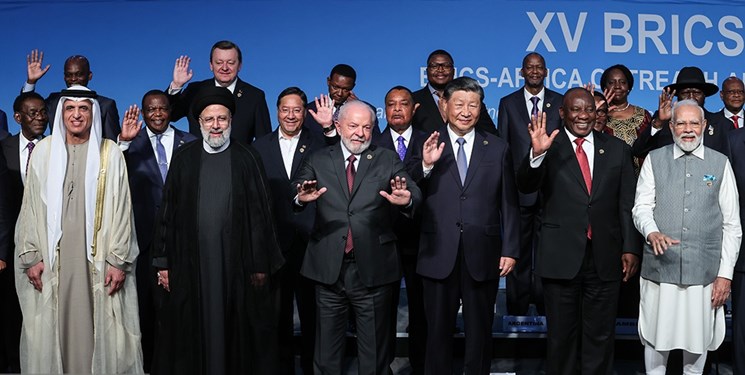Speaking in an interview with the website of the Strategic Council on Foreign Relations, Dr. Ehsan Kiani referred to the new membership of the six countries of Iran, Argentina, Egypt, Ethiopia, Saudi Arabia, and the United Arab Emirates in BRICS and clarified: About some of those countries, which are considered close partners of the United States; the reason for their request of membership in BRICS and the agreement of BRICS members with this request was due to the lack of possibility or sufficient ability to provide some of their interests in the regimes and institutions under the domination of the United States and the European Union.
He added: Especially after the Coronavirus epidemic and the war in Ukraine, most European countries and, to some extent, the United States faced various economic problems regarding inflation and energy prices. In contrast, China was more successful in overcoming the epidemic and remaining largely immune from the consequences of the war in Ukraine. Therefore, some of the Western allies concluded that they should have a positive, balanced approach to China and Russia on one side and the US on the other side and use other opportunities in the space of international relations. An example of this issue was seen in the position of Saudi Arabia and India towards the war in Ukraine.
The foreign policy expert assessed the strengthening of China’s presence in West Asia, North Africa, and Latin America in this framework and said: Using the opportunities that China can create in BRICS made the new members of BRICS come to the assessment that they can benefit from the capacities of this coalition.
Kiani continued: At the same time, BRICS, unlike coalitions like “G7” or “ASEAN,” lacks the unity around a coherent approach. Before the membership of the six new countries, the previous five countries did not necessarily have a single space. China and India have territorial disputes. China and Russia are competing in Central Asia. In addition, there are differences of opinion among those countries regarding alignment or non-alignment with the US. Now, the new members that have been added will also change the future of BRICS according to possible fronts. For example, strengthening China’s hegemony in BRICS is not desirable for some members, such as India and Brazil. Therefore, the balance between the members will determine its future.
Kiani considered the strengthening of cohesion or the increase of gaps in BRICS to be dependent on the future developments of the international system and explained that if Russia suffers a heavy defeat in the Ukraine war, the relationship between Saudi Arabia, the UAE, and India with the United States will probably become stronger. Therefore, the fate of the war in Ukraine is one of the variables that will be effective in the relationship between BRICS members and China or the United States. In addition, if the United States can succeed in containing China, for example, in the field of technology, and if it can reduce China’s market in Europe, it is another variable that will be effective in how BRICS members face the two powers.
The analyst of international affairs, while pointing to the impact of the membership of oil-rich countries in the Middle East and the importance of the security of energy supply of the BRICS member countries, said: BRICS is like the “Mineral Security Partnership” (MSP), which is an initiative led by the United States and Europe, with the membership of new members it can seek to increase public and private investments in the supply chain of critical minerals among allies.
Pointing to the capacities due to the increase of BRICS members, Kiani added Saudi Arabia and the UAE can positively impact the performance of BRICS because of their greater investment power. Provided that it is possible to think more coherently about synergy and increasing convergence in joint plans.
The expert on international affairs called the increase in the competition between China and the United States as having negative effects on the performance of BRICS and stated: If the competition between China and the United States is moderated, BRICS will have successes and will be immune from the consequences of this conflict. In this situation, the members can have proper cooperation with each other because they are not looking to form a new pole against the West. BRICS is not against the Western powers but can be different from them.
Referring to some positions of BRICS members regarding de-dollarization, Kiani noted that the dollar is a universal currency that still accounts for more than 50% of exchanges between countries. The euro follows it, and then the yuan with a much lower distance. BRICS now has a payment system for transactions between members, but still, the BRICS-affiliated “New Development Bank” operates largely in dollars.
He stressed that although de-dollarization is a target, the current potential and capabilities do not create such a possibility, adding: Some powers, especially powers that have conflicts or differences with the United States, or at least have differences of opinion, have shown tendencies to reduce dependence on the dollar, but being operational this goal in the short term and can easily create an environment where middle and regional powers without the need for dollars to can carry out their financial transactions and bilateral or multilateral settlements will not happen in the short term.










0 Comments